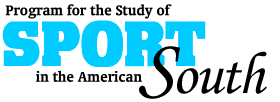

 |

|
|
Ethical Behavior in Sport: Sportsmanship Needs and Some Solutions March 27, 1997 Panelists: Charlie Adams Executive Director North Carolina High School Athletic Association Al Buehler Varsity Track & Field Coach Duke University Tim Stevens Sports Reporter The Raleigh News and Observer Reactors: Ed Shields, Professor Department of Physical Education, Exercise, and Sport Science at UNC-Chapel Hill Que Tucker, Director of Student Services North Carolina High School Athletic Association Ron Hyatt, Director The Program for the Study of Sport in the American South at UNC-Chapel Hill Symposium Endorsers: Department of Athletics, UNC-Chapel Hill Department of Philosophy, UNC-Chapel Hill Department of Physical Education, Exercise, and Sport Science, UNC-Chapel Hill Leisure Studies Curriculum, UNC-Chapel Hill North Carolina High School Athletic Association The Program for the Study of Sport in the American South, UNC-Chapel Hill |
Ethical Behavior in SportProgram Summary:On a day when many North Carolinians' minds were on the arrival of spring and the 1997 Men's and Women's NCAA Basketball Tournaments, over 30 students, athletes, teachers, coaches, and administrators from across the state met for two hours in the Frank Porter Graham Student Union on the campus of UNC-Chapel Hill. They attended a symposium concerning sportsmanship and sport ethics which was presented by UNC-Chapel Hill's Center for the Study of the American South and its Program for the Study of Sport in the American South. The focus of the symposium was how the standards of sportsmanship have declined in youth, high school, intercollegiate, and professional athletics. Many of the panelists and audience members remarked that poor ethical behavior seems to have trickled down from the television screens depicting high paid professionals into the thoughts and actions of young athletes. Panelist Charlie Adams, Executive Director of the North Carolina High School Athletic Association (NCHSAA), opened the symposium with a discussion of some national trends in addressing the problems of sportsmanship. He has been integrally involved with the development of a group to teach "Citizenship through Sports." The program is a coalition of national organizations including the National Basketball Association, the National Football League, Major League Baseball, the National Hockey League, the National Collegiate Athletics Association, and the National Federation of High School Athletic Associations. According to Adams, the leaders of these and other organizations have discussed their growing concern for poor ethical conduct among athletes of all levels. The focus of the coalition will be to teach civility in addition to skills during athletics training. The coalition recognizes that, as Adams stated, "You can't bottle good sportsmanship and keep it on the shelf. It takes a lot of work." The group hopes to accomplish that work through three methods:
Adams commented that this is the first time such a diverse group of the nation's power-centers for athletics have met. He hopes that with the financial support of the professional leagues, the more education-oriented organizations will develop effective, replicable programs to teach youth, high school, and college student-athletes how to behave ethically on the playing fields. The second presenter was Al Buehler, long-time head coach of the Duke University Varsity Track and Field Team. A man with years of experience in intercollegiate and international track competition, Buehler believes that sportsmanship has unquestionably declined over the past decades. He cited Webster's Dictionary as defining "sportsman" as an athlete displaying "fairness, grace, and a gentle demeanor." He said that such qualities are too seldom seen in modern sport. Buehler discussed how players, fans, and media representatives have developed standards of distrust, unfair play, and violent behavior. Weathered by the pressures to win and to make profits, many athletics programs try to take every advantage they can get -- whether fair or not. As an example, Buehler discussed that where in the past, football coaches would never accept a 5th down when aware that the officials had mistakenly granted an extra down, today's coaches have no reservations about using a 5th down to defeat an opponent (Missouri vs. Colorado, 1994). Similarly, he discussed how athletes used to inform a referee if he or she had made a mistake in that athlete's favor. Now, in the tradition of John MacEnroe, athletes in all sports throw temper-tantrums if they perceive that a referee's bad call worked against them, but they rarely volunteer that a referee made an error that worked in their favor. Coach Buehler cast the blame for such trends not on the athletes but on the coaches and administrators who have failed to teach the ethical standards of good sportsmanship. He agreed with Charlie Adams' assessment that education is critical to regaining good sportsmanship in sport. He noted that the Atlantic Coast Conference has initiated a "Push for Sportsmanship" designed to assist in that process of educating college and high school athletes. The symposium's third panelist, Tim Stevens, is a sports writer for the Raleigh News and Observer. Stevens discussed the proliferation of poor behaviors from the professional athletes to college, high school, and youth players as well as spectators. As a member of the media, Stevens remarked that it is unfair to criticize the media as the primary source for the increase in poor sportsmanship, but he did cast television networks, commercial advertisements, and sports reporters as contributors to the problem. According to Stevens, many individuals and organizations in the media directly contradict the goals of teaching good sportsmanship by promoting and commercializing images of non-sportsmanship. Dennis Rodman, for example, has skyrocketed to fame based on his image as the "anti-sportsman." Commercials joke that in order for star NBA player Grant Hill to achieve true success, he needs to learn how to play with more violence and anger. Even coaches are recognized for their unethical behavior. Bobby Knight, for example, a famed and widely revered coach of the Indiana Hoosiers Men's Basketball Team, is most known for his hot tempered antics, screaming at his own players, and throwing chairs onto the court when he disagrees with referee's perceptions. A special concern of Stevens is the increased incidence of violent cheers and behaviors of high school and college fans. He echoed the argument that spectators no longer cheer in support of "their team" so much as against the opponents. While exacerbated by on-the-field violence and tensions, fan violence, Stevens suggested, reflects problems not only within the sports environment but also in behavior throughout society. The first three panelists set the stage for Que Tucker, the Director of Student Services at the NCHSAA. Tucker has developed a program in North Carolina which may serve as a national model for teaching good sportsmanship in high school athletics. She gave a synopsis of her program's efforts to reach both coaches and student-athlete leaders. The NCHSAA conducts separate retreats for coaches and team captains to stress the message that "little eyes are upon you." She emphasized that most participants in the NCHSAA retreats readily accepted their responsibility to serve as good role models for those youth who look up to them for cues on how to conduct themselves. Tucker made specific reference to a common question from both coaches and athletes: "Is there a time when it's good to use intimidation?" She stated unequivocally that there is no such thing as good intimidation. She wanted all of the symposium participants to understand that the purpose of athletic competition is not to hinder the performance of your opponents but to improve your own; thus, a team should never adopt a stated goal of intimidating the opponent, that is, making him or her afraid of you. A final point by Tucker was that while most coaches and athletes understand that sportsmanship is important, they often seem willing to compromise their own standards of ethical behavior as the stakes increase. In other words, many condone the use of instrumental intimidation or violence, that which is perceived as a means to winning a critical contest. For example, while most coaches are willing to pull out a star player who commits an unsportsmanlike act, the same coaches are quick to reinsert the stars when "the game is on the line." Therefore, the coaching retreats conducted by the NCHSAA include role playing scenarios that will help coaches behave more ethically in high stakes situations. The strength of one's advocation of sportsmanship standards should be absolute, not relative to game situations. The final panelist was Dr. Ed Shields, a Professor in the University of North Carolina at Chapel Hill's Department of Physical Education, Exercise, and Sport Science. Shields' contribution to the symposium was oriented more around scientific analysis than on anecdotal observations. He summarized his study on North Carolina high school student-athlete's attitudes towards intimidation and violence in sports. In general, Shields noted that a majority of the state's high school students perceive intimidation and violence to be a significant proble with athletics at their own schools and at their opponents' schools. The sports with the most significant problems, according to the research of student opinions, were football, basketball, wrestling, soccer, and baseball. Following the panel discussion, the floor was opened to those in the audience of the symposium. For nearly an hour, the panelists discussed issues raised by audience members and answered their questions. Among the topics addressed were:
The panelists reported that they were impressed by the interest, enthusiasm, and intellectual curiosity of the symposium audience. Both audience members and panelists indicated that they enjoyed the interaction between young field practitioners and the state and national leaders in physical education, between young people beginning their careers and the time-tested and experienced administrators. The symposium met its goals of bringing a diverse collection of concerned students, athletes, teachers, coaches, and administrators together to identify problems concerning sportsmanship and to offer solutions to them. Please report any technical difficulties to this address. |